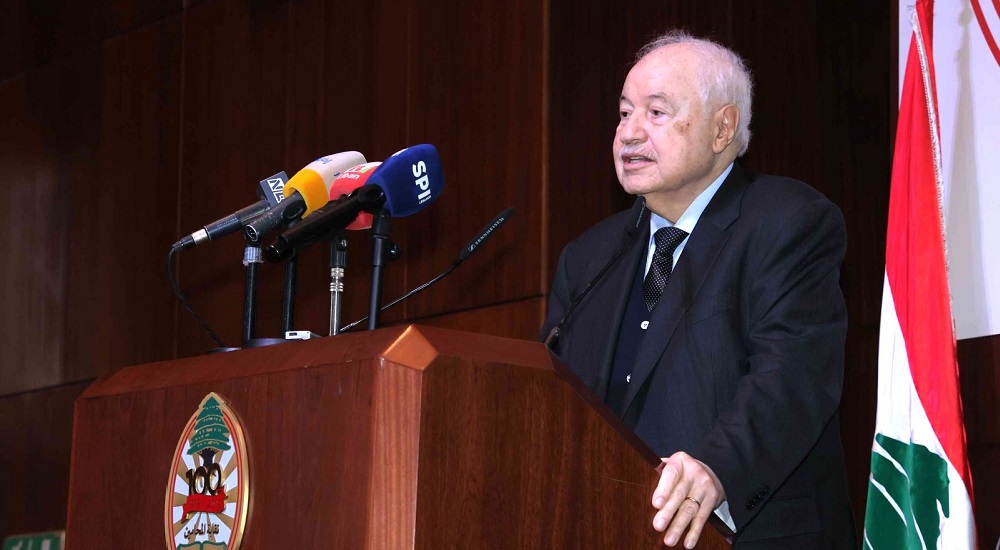Abu-Ghazaleh Calls for Establishing E-government in Lebanon

To help overcome the Lebanese Crisis:
BEIRUT - HE Dr. Talal Abu-Ghazaleh, founder and chairman of Talal Abu-Ghazaleh Global (TAG.Global), has asserted that the only way to end the crisis in Lebanon is by executing the digital transformation plan in the country beginning with the establishment of e-government by submitting a draft law in the Lebanese Parliament.
Dr. Abu-Ghazaleh’s statement was made during his participation as a keynote speaker at the ‘Digital Transformation in Lebanon - Opportunities and Challenges’ Conference, organized by the International Center for Human Justice (ICTJ) at the Beirut Bar Association under the auspices of Bar president, Mr. Nader Kaspar, in the presence of Lebanon’s Minister of the Displaced, Dr. Issam Sharafeddine, Lebanon's Minister of Telecommunications, Mr. Johnny Corom, MP Tony Frangieh, and Chief of the Court of Audit, Judge Muhammad Badran, in addition to representatives of security and military institutions, political and scientific figures, international and human rights organizations, judges, lawyers, academics and media professionals.
Dr. Abu-Ghazaleh further said: “You can save Lebanon by building an e-government that offers online services, and by establishing and implementing a digital system; given that Lebanon should not lag behind the neighboring countries.”
He stressed the readiness of TAG.Global to devote all its resources and expertise in order to launch this project in cooperation with the Bar Association, adding: “Prime Minister, Najib Mikati, is a dear friend, and together we can achieve great results in the implementation of digital transformation strategy.”
For her part, Head of the International Center for Human Justice, Lawyer Suha Ismail, said: “Building digital nations and introducing digital transactions in all aspects of life is becoming a major goal at global level. This is especially in light of the rapid development in the field of information technology and its impact on every detail of our private and public life, not to mention the keenness of the United Nations to protect human rights in the digital age and acknowledging the right to internet access as a fundamental human right.”
She also affirmed the importance of “promoting the development of ICT infrastructure and improving digital services in all institutions; whether public, private or civil institution, in addition to developing legislation of this sector in order to improve the performance of those entities and then improving the quality of services provided to the society members, achieving transparency, and fighting corruption,” .
The Chairman of the Information Technology Committee at the Lebanese Parliament, MP Tony Frangieh, urged the election of the Lebanese president in accordance with constitutional provisions, noting that Lebanon needs a president to restore order to political and legislative life, as well as uniting Lebanon to overcome successive crises.
He further said that “Our participation in this conference is the definite proof of our intentions to help Lebanon cope with constant changes in technology, in line with the capabilities of its people and their ambitions, highlighting how digital transactions would positively simplify citizens’ transactions, particularly during the difficult times Lebanon is currently facing”.
Mr. Corom indicated that “Several sector-related factors are essential for the success of the digital transformation plan, including, the development of infrastructure, securing adequate funding for the implementation of fiber optic cable extension projects, expanding global capacities and the establishment of international submarine cables such as the Cadmus 2 cable - which the Ministry is extending between Lebanon and Cyprus - with an effective regulatory framework and the establishment of advanced networks to use modern technologies. This is in addition to the development of the IT industry, government support for software development, and e-government apps., as well as empowering entrepreneurs.”
He concluded by affirming the importance of developing human capacities in the ICT sector, upgrading and modifying educational curricula related to the field of technology, providing training programs and scholarships in this area to build qualified cadres, developing guidelines and rules for remote work, and creating and funding digital integration programs.